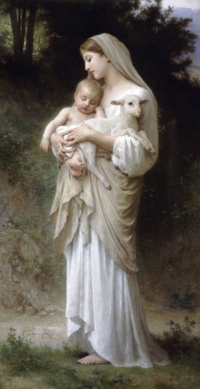Humanism
From The Art and Popular Culture Encyclopedia
| Revision as of 15:57, 22 January 2014 Jahsonic (Talk | contribs) ← Previous diff |
Revision as of 15:59, 22 January 2014 Jahsonic (Talk | contribs) Next diff → |
||
| Line 9: | Line 9: | ||
| ==See also== | ==See also== | ||
| - | :''[[Humanism (disambiguation)]], [[Renaissance humanism]]'' | + | * [[Alternatives to the Ten Commandments]] – Secular and humanist alternatives |
| - | * [[List of Humanists]] | + | * [[Community organising]] |
| + | * [[Extropianism]] | ||
| + | * [[Humanistic psychology]] | ||
| + | * [[List of humanists]] | ||
| + | * [[Materialism]] | ||
| + | * [[Misanthropy]] | ||
| * [[Natural rights]] | * [[Natural rights]] | ||
| + | * [[Objectivity (philosophy)]] | ||
| + | * [[Pluralistic Rationalism]] | ||
| + | * [[Post-theism]] | ||
| + | * [[Renaissance humanism]]'' | ||
| + | * [[Social psychology]] | ||
| ===Related concepts and philosophies=== | ===Related concepts and philosophies=== | ||
| Line 31: | Line 41: | ||
| * [[Skepticism]] | * [[Skepticism]] | ||
| * [[Transhumanism]] | * [[Transhumanism]] | ||
| - | |||
| - | ===Other=== | ||
| - | |||
| - | * [[Antihumanism]] | ||
| - | * [[Community organizing]] | ||
| - | * [[Humanistic psychology]] | ||
| - | * [[Misanthropy]] | ||
| - | * [[Social psychology]] | ||
| - | * [[Speciesism]] | ||
| - | * [[Ten Commandment Alternatives]] - Secular and humanist alternatives to the Ten Commandments | ||
| {{GFDL}} | {{GFDL}} | ||
Revision as of 15:59, 22 January 2014
|
" and we created you as a being neither celestial nor earthly, neither mortal nor immortal alone, so that you as a free and sovereign artist can mold and model yourself in the form that you prefer; you can degenerate to animal, but you can also rise to the higher, divine kingdom ... You alone have the power to develop and grow according to free will." --Pico della Mirandola, Oration on the Dignity of Man, tr. JWG |
|
Related e |
|
Featured: |
Humanism is a movement of philosophy and ethics that emphasizes the value and agency of human beings, individually and collectively, and generally prefers individual thought and evidence (rationalism, empiricism) over established doctrine or faith (fideism). The term humanism can be ambiguously diverse, and there has been a persistent confusion between several related uses of the term because different intellectual movements have identified with it over time. In philosophy and social science, humanism refers to a perspective that affirms some notion of a "human nature" (contrasted with antihumanism). In modern times, many humanist movements have become strongly aligned with secularism, with the term Humanism often used as a byword for non-theistic beliefs about ideas such as meaning and purpose; however, many early humanists, such as Ulrich von Hutten, a strong supporter of Martin Luther and the Reformation, were religious.
See also
- Alternatives to the Ten Commandments – Secular and humanist alternatives
- Community organising
- Extropianism
- Humanistic psychology
- List of humanists
- Materialism
- Misanthropy
- Natural rights
- Objectivity (philosophy)
- Pluralistic Rationalism
- Post-theism
- Renaissance humanism
- Social psychology
Related concepts and philosophies
- Agnosticism
- Atheism
- Confucianism
- Existentialism
- Free thought
- Humanitas
- Innate goodness
- Marxist humanism
- Materialism
- Secular morality
- Noble savage
- Objectivity (philosophy)
- Positivism
- Pragmatism
- Rationalism
- Skepticism
- Transhumanism


